Highlight of Everest Base Cmap Trek
- Enjoy the adventure of walking at the foot of the world's number one Mt. Everest.
- Grand views of mountains and beautiful landscapes from the start to the end.
- Super flight to Lukla with an awesome panorama of Himalaya with Mt. Everest.
- Enjoy the immense culture of Buddhism within Sherpa village with traditional life.
- Sagarmatha National Park, a world heritage site is enriched with flora and fauna.
- On top of the high Kalapathar with spectacular views of Mt. Everest and giant peaks.
Everest Base Camp Trek - 13 Days Overview
The Everest Base Camp Trek -13 Days takes you to the base of the world's highest peak, Mt. Everest (8,848m). This trek offers stunning panoramic mountain views, high-altitude Sherpa settlements, and a journey through Sagarmatha National Park, a UNESCO World Heritage Site since 1979. Along the way, trekkers will visit historic Buddhist monasteries such as Tengboche and Pangboche, experiencing the deep-rooted culture of the Himalayas.
The trek begins with a scenic flight from Kathmandu to Lukla, where the adventure starts on foot. The trail winds through picturesque Sherpa villages, dense forests, suspension bridges, and alpine landscapes, eventually leading to Everest Base Camp via the Khumbu Glacier. Key stops along the route include Namche Bazaar, Tengboche, Dingboche, and Gorak Shep.
This trek is a once-in-a-lifetime adventure, offering breathtaking Himalayan landscapes, rich Sherpa culture, and the incredible experience of standing near the world’s highest peak. However, proper preparation and physical fitness are essential for a safe and enjoyable journey.
Important Trekking Information
The Everest Base Camp Trek involves trekking at altitudes above 5,000m (16,400ft), making acclimatization essential to prevent altitude sickness. Trekkers must be prepared for changing weather conditions and challenging terrain, especially on the Lobuche to Gorak Shep and Gorak Shep to Everest Base Camp routes.
With the right preparation, this trek promises an unforgettable Himalayan adventure, blending nature, culture, and the thrill of being at the base of Mt. Everest.
Is the 13-Day Everest Base Camp Trek Suitable for You?
This tailor-made 13-day short itinerary EBC Trek is perfect for trekkers with sound physical abilities and a strong mentality. It ideally benefits travelers who wish to see the unmatched beauty and wonders of the Everest Region in a limited time frame.
- A Once-in-a-Lifetime Adventure – Standing at Everest Base Camp (5,364m) is a dream for many, and you have the chance to make it a reality! Imagine walking in the footsteps of legendary climbers while surrounded by breathtaking Himalayan peaks.
- Achievable for Anyone with Moderate Fitness – You don’t need to be a professional athlete! If you can walk 5–7 hours a day with proper breaks and gradual acclimatization, you can conquer this trek. Plus, experienced guides and porters will support you every step of the way.
- Safe & Well-Planned Itinerary – The 13-day route is carefully designed to allow proper acclimatization, reducing the risk of altitude sickness and ensuring a safer, more enjoyable experience.
- Unparalleled Scenery & Culture – From picturesque Sherpa villages and ancient monasteries to the stunning Khumbu Glacier, every step of this trek is an Instagram-worthy moment! You’ll also experience warm Sherpa hospitality and immerse yourself in Nepalese mountain culture.
- Manageable Time Commitment – In just 13 days, you can check off one of the world’s most iconic treks without taking an extended break from work or other responsibilities.
This exceptional trekking trail is dotted with small villages, prayer wheels, mani stones, and stunning scenery throughout the trekking trail. Give yourself a chance to converse with your newfound friends around the dining room fire in the evening. The Everest Base Camp Trekking route takes you to the iconic Kala Patthar (5545m), a significant vintage point known for its breathtaking Everest, Lhotse, and Nuptse scenery. Apart from that, Namche Bazaar mesmerizes you with its history, culture, and diversity.
How Does the Everest Trek 13 Days Start and End?
Everest Base Camp trek- 13 Days begins in the heart of Kathmandu, Nepal. Next, we will embark on a short and scenic flight to Tenzing-Hillary Airport in Lukla from either Kathmandu or Ramechhap, then begin the trek through Lukla on a trail full of diversity. Trekking through unique villages including Phakding, Benkar, Monjo, Jorsale, and others. Along the way, trekkers will pass through several monasteries, Chortens, and Prayer wheels. Crossover suspension bridges festooned with prayer flags and walk straight into the Sagarmatha National Park at Monjo.
Continuing our walk, we follow the trail all along the torrential Dudh Koshi River until we reach the buzzing Namche Bazaar. Namche is a tourist hub of the Everest region (Thamel of Everest) with interesting shops, fabulous food, stunning views, and culture. It is also a traditional trading hub and one of the highest permanently settled villages in the world.
After acclimatizing at the lower elevation in Namche, we head towards Tengboche and its impressive monastery. From Tengboche, the adventure leads to stunning Dingboche and Lobuche before reaching Gorak Shep and the iconic Kala Patthar for a surreal panoramic view of the Himalayas. Kala Patthar is famous for its breathtaking view of glittering peaks, including Mt. Everest, Mt. Nuptse, Mt. Pumori, Mt. Lhotse, and Mt. Changtse.
From here, clear views of the majestic Khumbu Glacier, the famed Khumbu Icefall, the glacial rivers, and the avalanche paths are awe-inspiring. Returning from the high Himalayas, you will get to explore the authentic lifestyle of the Sherpa community. Trekkers have an opportunity to familiarize themselves with the age-old, unchanged culture that they revere and ardently practice. Everest's trek ends in Lukla before returning to the medieval capital city of Kathmandu.

Everest Base Camp Trek : 13 Days Distance and Altitude Coverage
Day | Activity | Altitude (m/ft) | Distance (km/miles) | Duration (hours) | Elevation Gain (m/ft) |
1 | Arrival in Kathmandu, group meeting | 1,350 m / 4,430 ft | - | - | - |
2 | Fly to Lukla , trek to Phakding | 2,860 m / 9,383 ft 2,610 m / 8,560 ft | 8 km / 5 miles | 3-4 hrs | -218 m / -719 ft |
3 | Trek to Namche Bazaar | 3,440 m / 11,286 ft | 10.5 km / 6.5 miles | 5-6 hrs | +830 m / +2,723 ft |
4 | Acclimatization day at Namche Bazaar; hike to Everest View Hotel | 3,880 m / 12,729 ft | 3 km / 1.86 miles (round trip) | 2-3 hrs | +440 m / +1,443 ft |
5 | Trek to Tengboche | 3,850 m / 12,632 ft | 9 km / 5.6 miles | 4-5 hrs | +410 m / +1,345 ft |
6 | Trek to Dingboche | 4,410 m / 14,468 ft | 12 km / 7.45 miles | 5-6 hrs | +560 m / +1,837 ft |
7 | Acclimatization day at Dingboche; hike to Nangkartshang Peak | 5,083 m / 16,677 ft | 5 km / 3.1 miles (round trip) | 3-4 hrs | +673 m / +2,208 ft |
8 | Trek to Lobuche | 4,910 m / 16,109 ft | 9 km / 5.6 miles | 4-5 hrs | +500 m / +1,640 ft |
9 | Trek to Gorakshep and Everest Base Camp and return to Gorakshep | 5,164 m / 16,942 ft 5,364 m / 17,598 ft | 15 km / 9.32 miles (round trip) | 7-8 hrs | +454 m / +1,489 ft |
10 | Hike to Kala Patthar and descend to Pheriche | 5,545 m / 18,193 ft 4,280 m / 14,042 ft | 13 km / 8.07 miles | 6-7 hrs | +381 m / +1,250 ft / -1,265 m / -4,151 ft |
11 | Trek to Namche Bazaar | 3,440 m / 11,286 ft | 14 km / 8.7 miles | 5-6 hrs | -840 m / -2,756 ft |
12 | Trek to Lukla | 2,860 m / 9,383 ft | 19 km / 11.8 miles | 6-7 hrs | -612 m / -2,008 ft |
13 | Fly back to Kathmandu | 1,350 m / 4,430 ft | - | 35 min flight | -1,478 m / -4,850 ft |
How to Prepare for 13 Days Everest Base Camp Trek?
As for the preparation, the drill states that trekkers must hike up and down an unpaved trail for 11 days carrying their day bag pack. Trekkers will have to take 3 to 6 kilos on average and walk for 5-6 hours daily.
For that, working on your strength and endurance for a few months is advisable before heading on this trek. Train and tone your body for 5-6 days a week, and once in a while, walk up and down a hill with your bag packed with 6 to 12 kg. This will help your legs and muscles get stronger. If you want to conquer Everest Base Camp, then start practicing and get into the trek mode as soon as you can. For more details, click here.


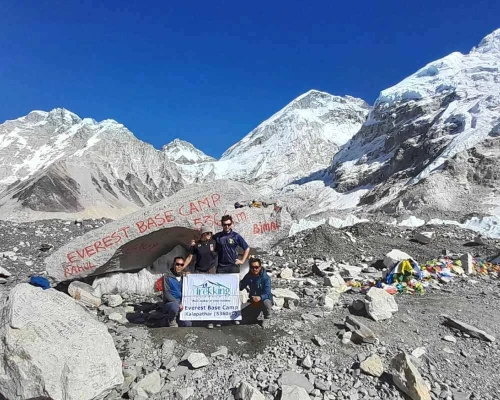
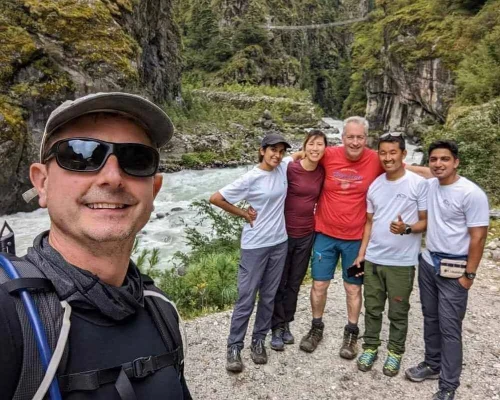
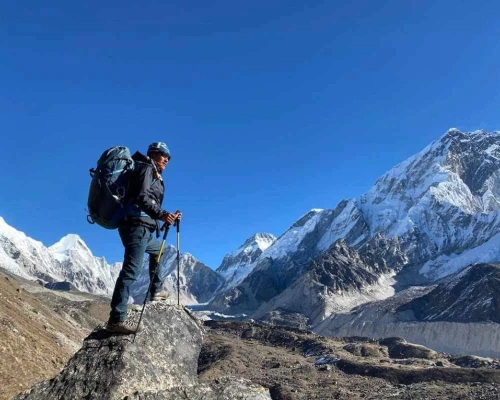
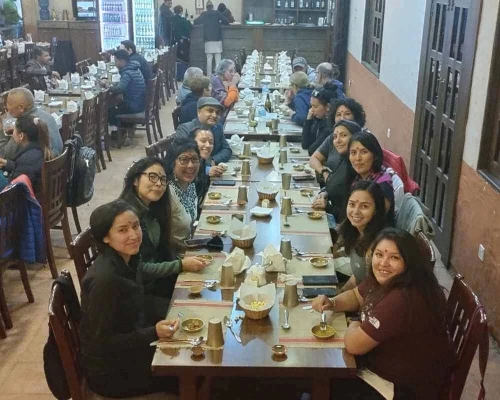
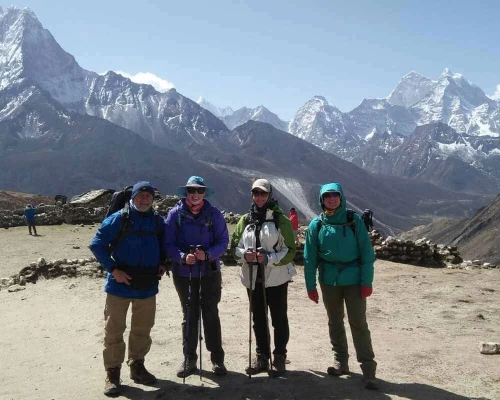
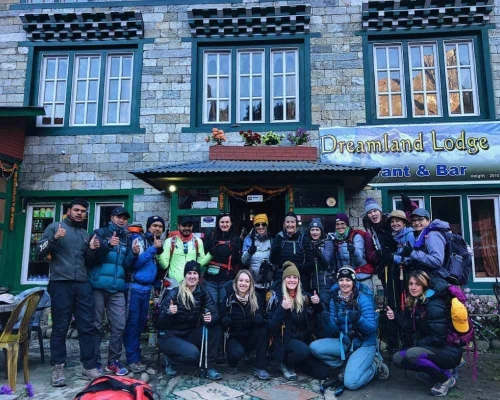
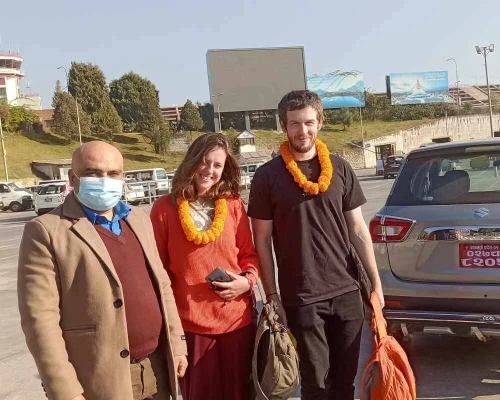



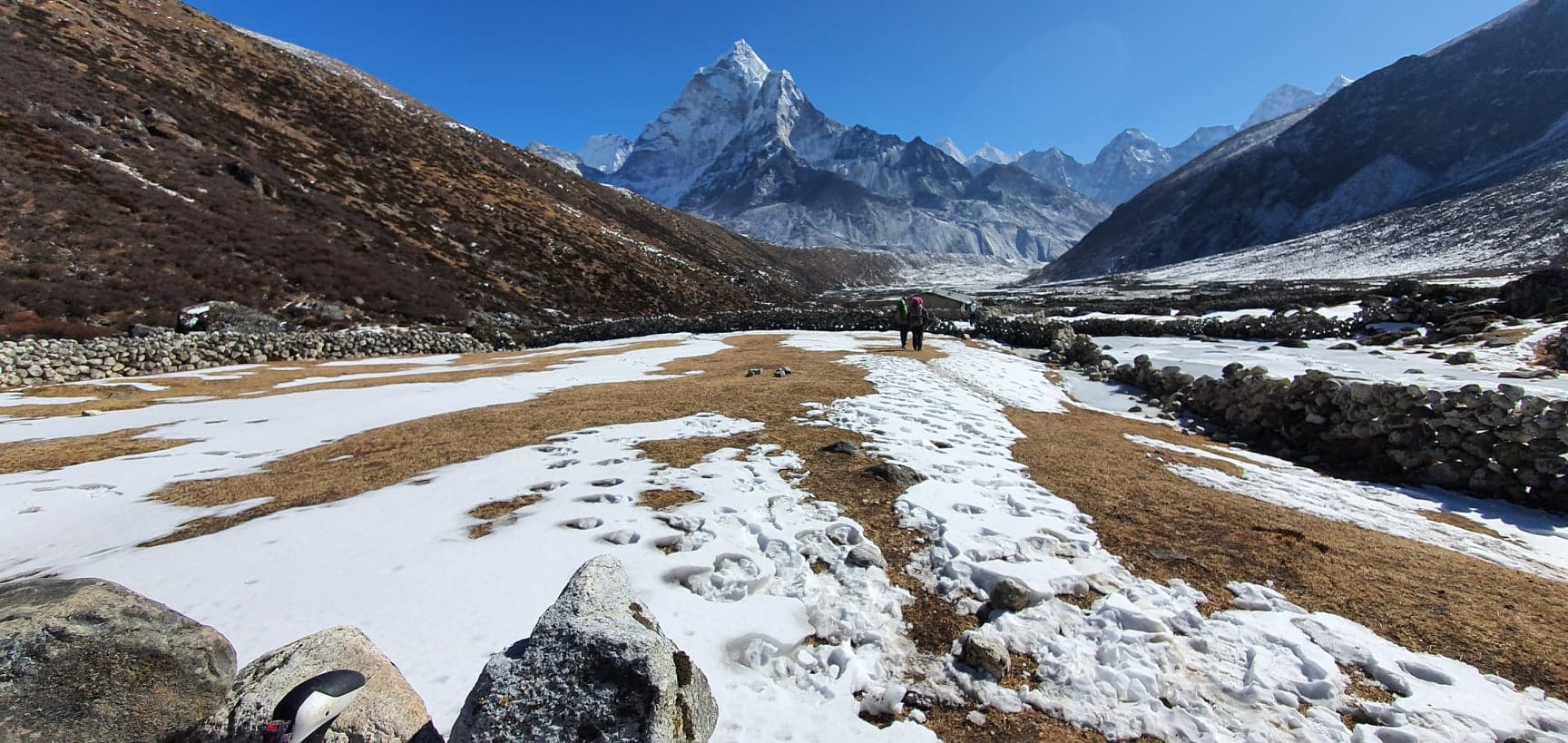
 General
General Upper Body
Upper Body Lower Body
Lower Body Other Essentials
Other Essentials


